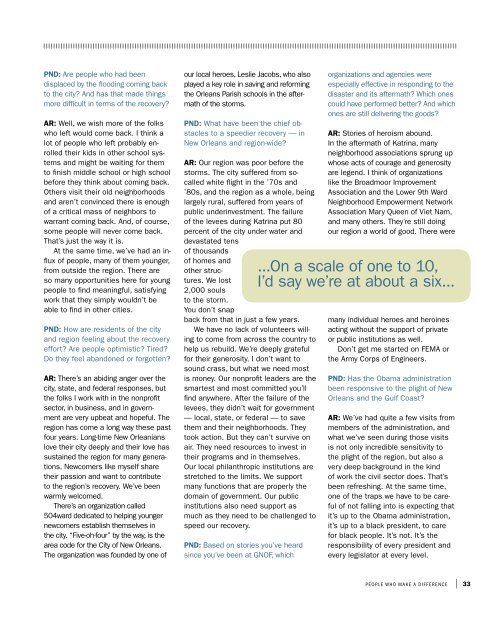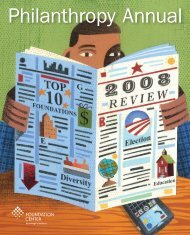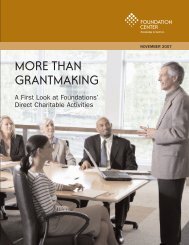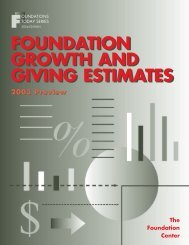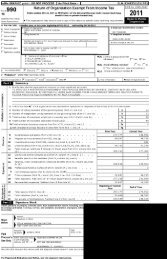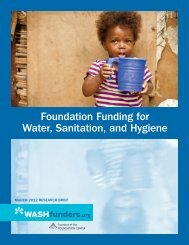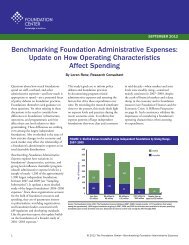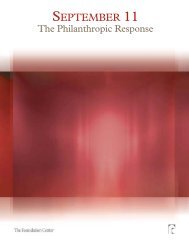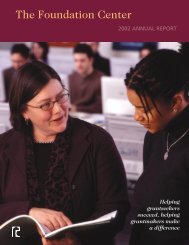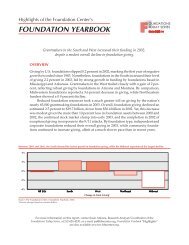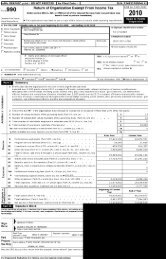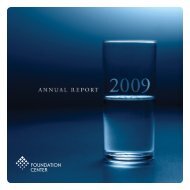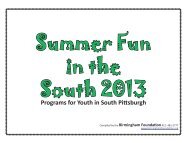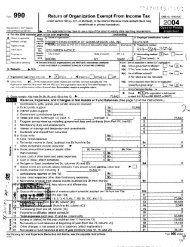Download Philanthropy Annual PDF - Foundation Center
Download Philanthropy Annual PDF - Foundation Center
Download Philanthropy Annual PDF - Foundation Center
Create successful ePaper yourself
Turn your PDF publications into a flip-book with our unique Google optimized e-Paper software.
PND: Are people who had been<br />
displaced by the flooding coming back<br />
to the city? And has that made things<br />
more difficult in terms of the recovery?<br />
AR: Well, we wish more of the folks<br />
who left would come back. I think a<br />
lot of people who left probably enrolled<br />
their kids in other school systems<br />
and might be waiting for them<br />
to finish middle school or high school<br />
before they think about coming back.<br />
Others visit their old neighborhoods<br />
and aren’t convinced there is enough<br />
of a critical mass of neighbors to<br />
warrant coming back. And, of course,<br />
some people will never come back.<br />
That’s just the way it is.<br />
At the same time, we’ve had an influx<br />
of people, many of them younger,<br />
from outside the region. There are<br />
so many opportunities here for young<br />
people to find meaningful, satisfying<br />
work that they simply wouldn’t be<br />
able to find in other cities.<br />
PND: How are residents of the city<br />
and region feeling about the recovery<br />
effort? Are people optimistic? Tired?<br />
Do they feel abandoned or forgotten?<br />
AR: There’s an abiding anger over the<br />
city, state, and federal responses, but<br />
the folks I work with in the nonprofit<br />
sector, in business, and in government<br />
are very upbeat and hopeful. The<br />
region has come a long way these past<br />
four years. Long-time New Orleanians<br />
love their city deeply and their love has<br />
sustained the region for many generations.<br />
Newcomers like myself share<br />
their passion and want to contribute<br />
to the region’s recovery. We’ve been<br />
warmly welcomed.<br />
There’s an organization called<br />
504ward dedicated to helping younger<br />
newcomers establish themselves in<br />
the city. “Five-oh-four” by the way, is the<br />
area code for the City of New Orleans.<br />
The organization was founded by one of<br />
our local heroes, Leslie Jacobs, who also<br />
played a key role in saving and reforming<br />
the Orleans Parish schools in the aftermath<br />
of the storms.<br />
PND: What have been the chief obstacles<br />
to a speedier recovery — in<br />
New Orleans and region-wide?<br />
AR: Our region was poor before the<br />
storms. The city suffered from socalled<br />
white flight in the ’70s and<br />
’80s, and the region as a whole, being<br />
largely rural, suffered from years of<br />
public underinvestment. The failure<br />
of the levees during Katrina put 80<br />
percent of the city under water and<br />
devastated tens<br />
of thousands<br />
of homes and<br />
other structures.<br />
We lost<br />
2,000 souls<br />
to the storm.<br />
You don’t snap<br />
back from that in just a few years.<br />
We have no lack of volunteers willing<br />
to come from across the country to<br />
help us rebuild. We’re deeply grateful<br />
for their generosity. I don’t want to<br />
sound crass, but what we need most<br />
is money. Our nonprofit leaders are the<br />
smartest and most committed you’ll<br />
find anywhere. After the failure of the<br />
levees, they didn’t wait for government<br />
— local, state, or federal — to save<br />
them and their neighborhoods. They<br />
took action. But they can’t survive on<br />
air. They need resources to invest in<br />
their programs and in themselves.<br />
Our local philanthropic institutions are<br />
stretched to the limits. We support<br />
many functions that are properly the<br />
domain of government. Our public<br />
institutions also need support as<br />
much as they need to be challenged to<br />
speed our recovery.<br />
PND: Based on stories you’ve heard<br />
since you’ve been at GNOF, which<br />
organizations and agencies were<br />
especially effective in responding to the<br />
disaster and its aftermath? Which ones<br />
could have performed better? And which<br />
ones are still delivering the goods?<br />
AR: Stories of heroism abound.<br />
In the aftermath of Katrina, many<br />
neighborhood associations sprung up<br />
whose acts of courage and generosity<br />
are legend. I think of organizations<br />
like the Broadmoor Improvement<br />
Association and the Lower 9th Ward<br />
Neighborhood Empowerment Network<br />
Association Mary Queen of Viet Nam,<br />
and many others. They’re still doing<br />
our region a world of good. There were<br />
...On a scale of one to 10,<br />
I’d say we’re at about a six...<br />
many individual heroes and heroines<br />
acting without the support of private<br />
or public institutions as well.<br />
Don’t get me started on FEMA or<br />
the Army Corps of Engineers.<br />
PND: Has the Obama administration<br />
been responsive to the plight of New<br />
Orleans and the Gulf Coast?<br />
AR: We’ve had quite a few visits from<br />
members of the administration, and<br />
what we’ve seen during those visits<br />
is not only incredible sensitivity to<br />
the plight of the region, but also a<br />
very deep background in the kind<br />
of work the civil sector does. That’s<br />
been refreshing. At the same time,<br />
one of the traps we have to be careful<br />
of not falling into is expecting that<br />
it’s up to the Obama administration,<br />
it’s up to a black president, to care<br />
for black people. It’s not. It’s the<br />
responsibility of every president and<br />
every legislator at every level.<br />
People Who Make a Difference | 33


